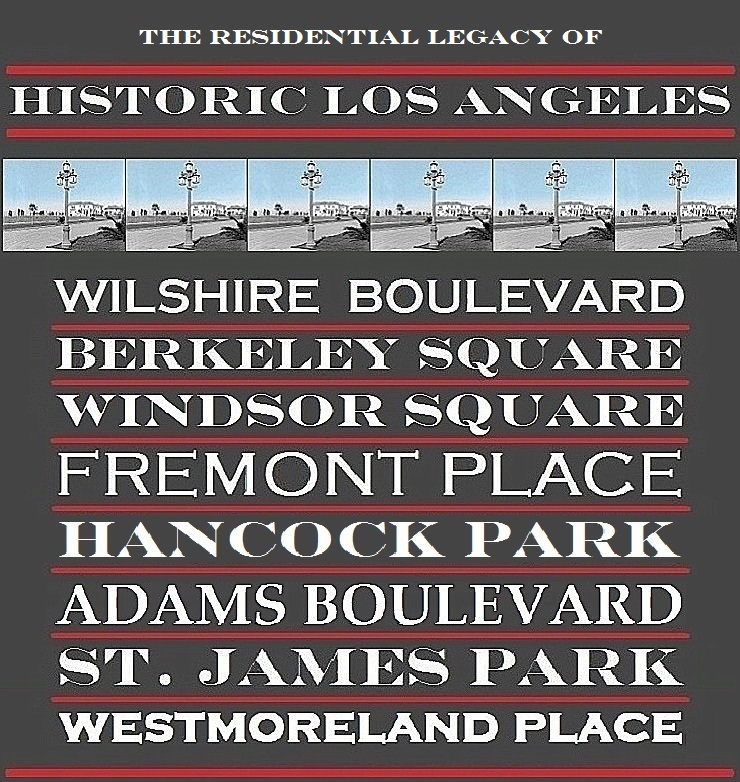1302 North Hobart Boulevard
PLEASE ALSO SEE OUR COMPANION HISTORIES
FOR AN INTRODUCTION TO HISTORIC LOS ANGELES, CLICK HERE
Illustrations: Private Collection; Library of Congress/Sanborn Maps; GSV
- Built in 1907, per the Los Angeles County Assessor, at the northeast corner of Hobart Boulevard and Fountain Avenue on Lot 25 of Mortimer's Gateway Tract. The tract was then part of the City of Hollywood prior to its annexation to Los Angeles on February 7, 1910. At the side of the house when it was built (along the southerly curb of today's Fountain Avenue) was the northerly line of the Town of Colegrove, annexed to Los Angeles on October 27, 1909
- Retiring from business in upstate New York after 1905, George Lemuel Lovejoy arrived in California with his family and enough capital to begin investing in Los Angeles real estate. It is unclear as to whether he built what became 1302 North Hobart himself, or bought a house that had recently been completed on Crown Avenue in sparsely settled easterly Hollywood, the roadway's north-south path existing primarily on tract maps. Lovejoy was listed at "436 S Crown Av" in the 1911 Los Angeles city directory, presumably a continuation of his listing in pre-annexation Hollywood directories, although a 1907 fire-insurance map indicates that Crown Avenue south toward its intersection with Benefit Avenue (renamed Fountain after annexation at the same time that Prospect Avenue became Hollywood Boulevard) was designated "Oak Avenue"—on which, at #436, Lovejoy is listed in the 1912 Los Angeles city directory. Many Hollywood streets and addresses were confusingly altered in the decade after its incorporation in 1903 as tracts formed and reformed, with most of its roadways and all of its numbers finally converting fully to Los Angeles's established practices by 1913. After having lived at "436 S Crown Av" and then "436 Oak Av," both at the northeast corner of Benefit Avenue, Lovejoy had to now adjust himself (and his stationery) to having his house designated as 1302 North Hobart Boulevard, at the northeast corner of Fountain Avenue. As a real-estate investor, he can only have enjoyed the remunerative consolidation of bucolic and largely pre-film Hollywood with burgeoning Los Angeles and the security of the city's new aqueduct that would bring abundant water down from the Owens Valley once it opened in November 1913
- The Lovejoys would remain at 1302 North Hobart until 1922. On May 8 of that year, the Department of Buildings issued George Lovejoy a construction permit for a new house at 739 Lorraine Boulevard. One notable family event took place in the Hobart Boulevard house when the eldest of four Lovejoy daughters, Buelah Lolita, married geologist Clarence Osborne there on February 4, 1916. (George Jr., an only son, had come along after the four girls.) George Lovejoy Sr. and his wife Alice would remain on Lorraine Boulevard until not long after his death on August 8, 1940; the details of his will as reported in the Los Angeles Times two weeks later offer a notion of the old man's worldview. Described as a wealthy real estate operator, Lovejoy left a $6,000 bonus to his grandson George Lemuel Lovejoy III, but one payable only if the then 13-year-old would, in essence, remain a child until he was 25 years old. "I hope he will not go with any girl who drinks spiritous [sic] liquors, smokes or wears slacks on the street or in public places," the George Sr. wrote. "It is also my hope that he will pick out a good neat mother, who knows how to cook, and marry her daughter." George III was left in addition a razor that had been used by several generations of Lovejoy men. (The inheritance of this obsolete antique appears to have been unrestricted)
- The house at 1302 North Hobart had been sold to a George Hathaway, who made minor alterations in the fall of 1923 while maintaining it as a single-family dwelling. In 1924, 1302 was acquired by the Syrian-born real estate investor who lived next door to the north, Benjamin N. Jereissati, who had recently arrived in Los Angeles from Phoenix and had a plan for the redevelopment of the northeast corner of Hobart and Fountain. After a permit was issued on November 3, 1924, what had been 1302 North Hobart was jacked up and moved east on its lot and, turned 90° counterclockwise to face south, made into a two-family dwelling. Its new address would be 5287-89 Fountain Avenue, its backyard later created by borrowing part of the property of Jereissati's original house, which still stands at 1308 North Hobart. On the corner on the westerly 115 feet of Lot 25, which Jereissati had flipped to developer John R. King, the current (and basically untouched) brick row of stores facing Fountain was built after King was issued a permit on September 28, 1926
Illustrations: Private Collection; Library of Congress/Sanborn Maps; GSV






